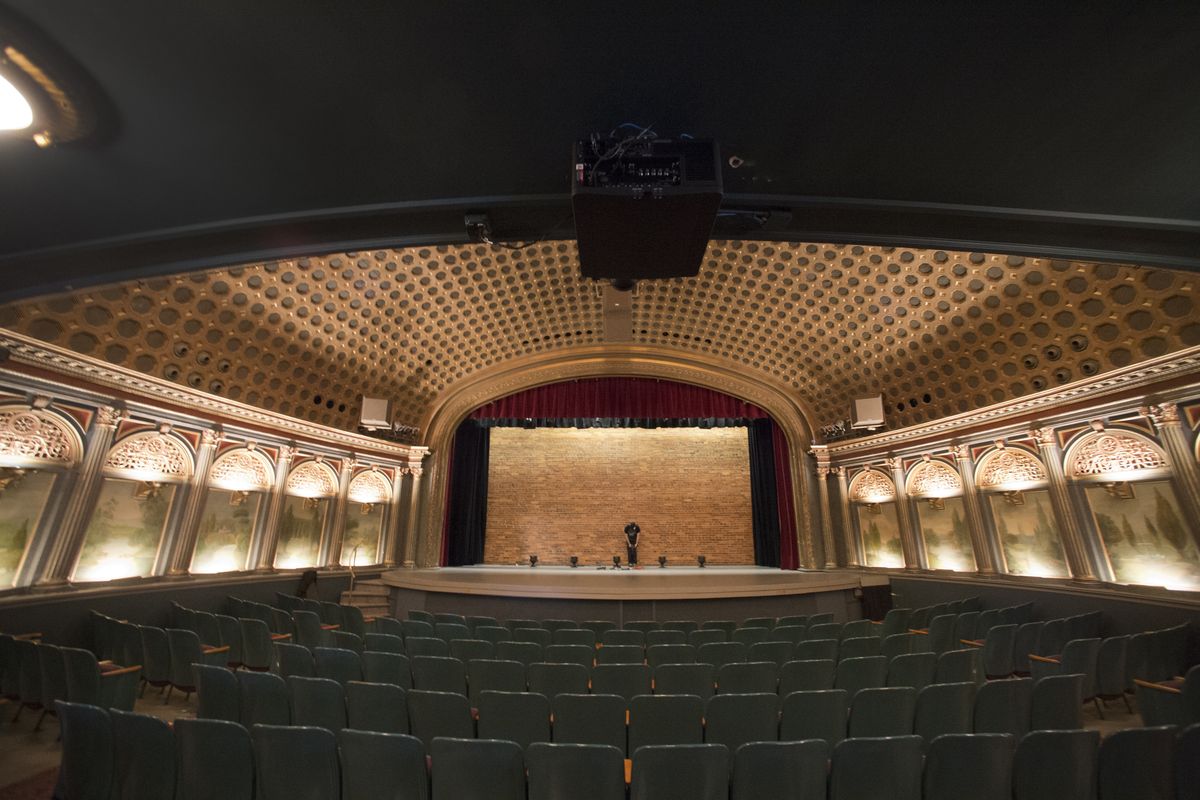Bing Theater continues to benefit from artistic, structural upgrades

Jerry Dicker has invested in a lot of downtown Spokane real estate, but it’s the Bing Crosby Theater that he calls his “labor of love.”
Since acquiring the Bing in February 2012, Dicker estimates that he’s put at least $400,000 of his own money into renovating and updating the theater, and that figure will no doubt swell as the structural and artistic improvements continue. Dicker, a California businessman who owns GVD Commercial Properties, knew the Bing wasn’t going to be a moneymaker when he took it on, but he believes that the venue’s increased activity can only encourage prosperity in Spokane’s art scene.
Dicker’s major Spokane real estate acquisitions include Hotel Ruby and its adjoining Sapphire Lounge, as well as a Ramada Express that he’s turned into a Howard Johnson. “Artistic preservationist” has become his second profession of sorts. Shortly after purchasing the Bing, he and his wife, Patty, took over mortgage payments for the struggling Interplayers Theater. He has donated to the Museum of Arts and Culture and protested the museum board’s controversial firing of executive director Forrest Rodgers. And now the Bing has consumed most of his time and attention.
“The Bing as a venue is in greater and greater demand,” Dicker said. “We’ve done two or three times as many shows in the last 12 months as we did the 12 months preceding it.” Dicker and the Bing’s general manager, Michael Smith, have also focused on expanding the variety of events the theater hosts – everything from stand-up comedy to ballet to live theater to film.
This signals the rebirth of a building that’s just shy of a century old, one that began life as an 800-seat movie house right as the film industry was starting to take off. Opened in 1915, the Bing, then known as the Clemmer Theatre, was designed by British architect Edwin W. Houghton, the man responsible for the Moore, Seattle’s oldest operating theater.
Ownership of the Clemmer changed hands numerous times in the ensuing decades. It was purchased from its original owner, silver tycoon August Paulsen, by Universal Studios in 1925, when it began hosting live musical performances as well as motion pictures. (The man it’s named after, Bing Crosby, was reported to have performed there many times in the mid-’20s.) Later renamed the Audian and then the State, the theater continued operating as a movie house until 1985, when it was renovated and repurposed as the Metropolitan Theater of Performing Arts.
The Met remained a venue for live performances, educational presentations and the occasional film from 1988 to 2006, when then-owner Mitch Silver rechristened it the Bing Crosby Theater. Dicker purchased the Bing from Silver two years ago, and now he’s made it his goal to broaden the theater’s utility.
In the past 24 months, the Bing has been in the process of a makeover that’s far from finished. Its infrastructure has been strengthened, the leaky roof replaced, and the plumbing, heating and air conditioning have all been updated. The downstairs dressing rooms and green rooms have been remodeled to be more comfortable for touring artists. The theater’s technology has also been bolstered, boasting a new sound system (which Dicker says is “the best in the city”), 30-foot screen and top-of-the-line digital projector that Dicker hopes will allow the Bing to book more film programs (the theater was most recently a host to the Spokane International Film Festival).
Dicker has also expanded the space to the building’s top two stories, which he said hadn’t been used in some 25 years. A spiral staircase leads to a small third-floor lounge called Ovations, which has a modern, minimalistic aesthetic and offers beer, wine and appetizers. The fourth floor is currently vacant, a large, bright room that Dicker says could really be used for anything – an art gallery, for instance, or a space for private functions.
But beyond the obvious physical transformations, perhaps the most important improvement for Dicker is the content the theater is bringing to its stage. “We want this to be the best theater not just in Spokane, but in the Northwest,” Dicker said. “We would even like to have a national reputation, if possible.”
Along with Smith, who has been with the theater in various capacities since 1987, Dicker said he has been collaborating with local artists, musicians and acting groups in hopes of making the Bing a go-to venue for regional artistic events. The current partnerships he cites include Spokane Art School, Lake City Playhouse and Get Lit!
“The reason we’re doing very well is that (Michael and I) are passionate about the Bing,” Dicker said. He and Smith converse daily about theater operations, and they describe their working relationship as a well-oiled machine – Smith manages scheduling, books artists and ensures everything is in place so that everything runs smoothly, while Dicker oversees all financial matters. “From my standpoint, this has not been difficult, because Michael makes it look easy,” Dicker said.
Two years into this venture, and Dicker says that, although he hasn’t turned a profit, he and Smith have cut the Bing’s financial losses in half. Although Dicker says there’s far more updating and restoring to be done – and he admits that improvements will likely never be complete – he hopes the Bing can eventually become a self-sustaining business that will last for another century or more.
“It’s not necessarily about the money; it’s about doing the best we can,” Dicker said. “We’ve improved the Bing intellectually, artistically and physically. We feel that we’ve got a long way to go, but it’s our mission to do this.”